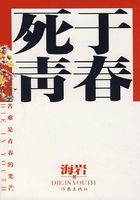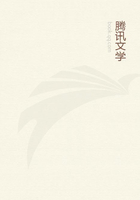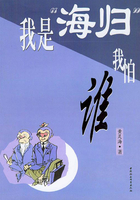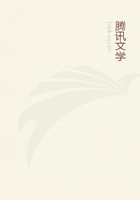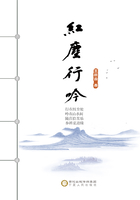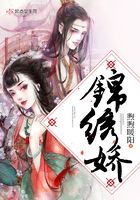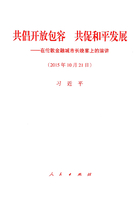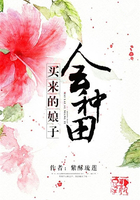When they reached the house Mrs. Carey had died in — it was in a dreary, respectable street between Notting Hill Gate and High Street, Kensington — Emma led Philip into the drawing-room. His uncle was writing letters of thanks for the wreaths which had been sent. One of them, which had arrived too late for the funeral, lay in its cardboard box on the hall-table.
“Here's Master Philip,” said Emma.
Mr. Carey stood up slowly and shook hands with the little boy. Then on second thoughts he bent down and kissed his forehead. He was a man of somewhat less than average height, inclined to corpulence, with his hair, worn long, arranged over the scalp so as to conceal his baldness. He was clean-shaven. His features were regular, and it was possible to imagine that in his youth he had been good-looking. On his watch-chain he wore a gold cross.
“You're going to live with me now, Philip,” said Mr. Carey. “Shall you like that?”
Two years before Philip had been sent down to stay at the vicarage after an attack of chicken-pox; but there remained with him a recollection of an attic and a large garden rather than of his uncle and aunt.
“Yes.”
“You must look upon me and your Aunt Louisa as your father and mother.”
The child's mouth trembled a little, he reddened, but did not answer.
“Your dear mother left you in my charge.”
Mr. Carey had no great ease in expressing himself. When the news came that his sister-in-law was dying, he set off at once for London, but on the way thought of nothing but the disturbance in his life that would be caused if her death forced him to undertake the care of her son. He was well over fifty, and his wife, to whom he had been married for thirty years, was childless; he did not look forward with any pleasure to the presence of a small boy who might be noisy and rough. He had never much liked his sister-in-law.
“I'm going to take you down to Blackstable tomorrow,” he said.
“With Emma?”
The child put his hand in hers, and she pressed it.
“I'm afraid Emma must go away,” said Mr. Carey.
“But I want Emma to come with me.”
Philip began to cry, and the nurse could not help crying too. Mr. Carey looked at them helplessly.
“I think you'd better leave me alone with Master Philip for a moment.”
“Very good, sir.”
Though Philip clung to her, she released herself gently. Mr. Carey took the boy on his knee and put his arm round him.
“You mustn't cry,” he said. “You're too old to have a nurse now. We must see about sending you to school.”
“I want Emma to come with me,” the child repeated.
“It costs too much money, Philip. Your father didn't leave very much, and I don't know what's become of it. You must look at every penny you spend.”
Mr. Carey had called the day before on the family solicitor. Philip's father was a surgeon in good practice, and his hospital appointments suggested an established position; so that it was a surprise on his sudden death from blood-poisoning to find that he had left his widow little more than his life insurance and what could be got for the lease of their house in Bruton Street. This was six months ago; and Mrs. Carey, already in delicate health, finding herself with child, had lost her head and accepted for the lease the first offer that was made. She stored her furniture, and, at a rent which the parson thought outrageous, took a furnished house for a year, so that she might suffer from no inconvenience till her child was born. But she had never been used to the management of money, and was unable to adapt her expenditure to her altered circumstances. The little she had slipped through her fingers in one way and another, so that now, when all expenses were paid, not much more than two thousand pounds remained to support the boy till he was able to earn his own living. It was impossible to explain all this to Philip and he was sobbing still.
“You'd better go to Emma,” Mr. Carey said, feeling that she could console the child better than anyone.
Without a word Philip slipped off his uncle's knee, but Mr. Carey stopped him.
“We must go tomorrow, because on Saturday I've got to prepare my sermon, and you must tell Emma to get your things ready today. You can bring all your toys. And if you want anything to remember your father and mother by you can take one thing for each of them. Everything else is going to be sold.”
The boy slipped out of the room. Mr. Carey was unused to work, and he turned to his correspondence with resentment. On one side of the desk was a bundle of bills, and these filled him with irritation. One especially seemed preposterous. Immediately after Mrs. Carey's death Emma had ordered from the florist masses of white flowers for the room in which the dead woman lay. It was sheer waste of money. Emma took far too much upon herself. Even if there had been no financial necessity, he would have dismissed her.
But Philip went to her, and hid his face in her bosom, and wept as though his heart would break. And she, feeling that he was almost her own son — she had taken him when he was a month old — consoled him with soft words. She promised that she would come and see him sometimes, and that she would never forget him; and she told him about the country he was going to and about her own home in Devonshire — her father kept a turnpike on the high-road that led to Exeter, and there were pigs in the sty, and there was a cow, and the cow had just had a calf — till Philip forgot his tears and grew excited at the thought of his approaching journey. Presently she put him down, for there was much to be done, and he helped her to lay out his clothes on the bed. She sent him into the nursery to gather up his toys, and in a little while he was playing happily.
But at last he grew tired of being alone and went back to the bed-room, in which Emma was now putting his things into a big tin box; he remembered then that his uncle had said he might take something to remember his father and mother by. He told Emma and asked her what he should take.
“You'd better go into the drawing-room and see what you fancy.”
“Uncle William's there.”
“Never mind that. They're your own things now.”
Philip went downstairs slowly and found the door open. Mr. Carey had left the room. Philip walked slowly round. They had been in the house so short a time that there was little in it that had a particular interest to him. It was a stranger's room, and Philip saw nothing that struck his fancy. But he knew which were his mother's things and which belonged to the landlord, and presently fixed on a little clock that he had once heard his mother say she liked. With this he walked again rather disconsolately upstairs. Outside the door of his mother's bed-room he stopped and listened. Though no one had told him not to go in, he had a feeling that it would be wrong to do so; he was a little frightened, and his heart beat uncomfortably; but at the same time something impelled him to turn the handle. He turned it very gently, as if to prevent anyone within from hearing, and then slowly pushed the door open. He stood on the threshold for a moment before he had the courage to enter. He was not frightened now, but it seemed strange. He closed the door behind him. The blinds were drawn, and the room, in the cold light of a January afternoon, was dark. On the dressing-table were Mrs. Carey's brushes and the hand mirror. In a little tray were hairpins. There was a photograph of himself on the chimney-piece and one of his father. He had often been in the room when his mother was not in it, but now it seemed different. There was something curious in the look of the chairs. The bed was made as though someone were going to sleep in it that night, and in a case on the pillow was a night-dress.
Philip opened a large cupboard filled with dresses and, stepping in, took as many of them as he could in his arms and buried his face in them. They smelt of the scent his mother used. Then he pulled open the drawers, filled with his mother's things, and looked at them: there were lavender bags among the linen, and their scent was fresh and pleasant. The strangeness of the room left it, and it seemed to him that his mother had just gone out for a walk. She would be in presently and would come upstairs to have nursery tea with him. And he seemed to feel her kiss on his lips.
It was not true that he would never see her again. It was not true simply because it was impossible. He climbed up on the bed and put his head on the pillow. He lay there quite still.

